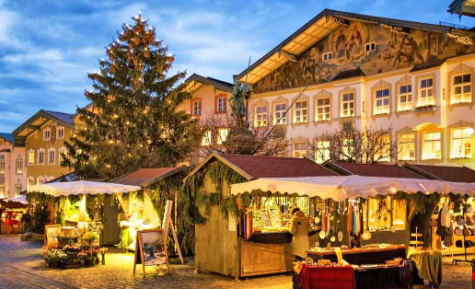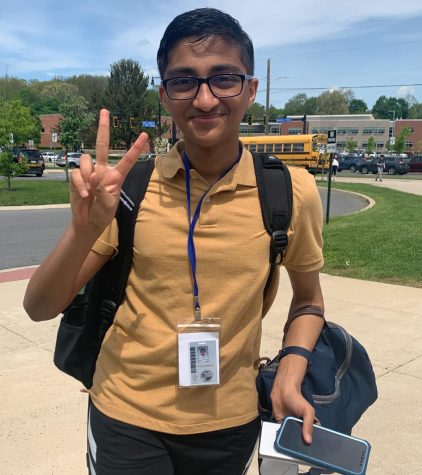Foreign Correspondence- David Wagner
September 30, 2016
12/11/16 — Another Fun Experience
Christmas time in Germany is really interesting. I’ve been doing a little bit of traveling between different cities in the area, and visiting different Christmas markets. Yesterday (Saturday) I went to Münster with two other exchange students, one from New Hampshire and the other from Japan.
The previous week was pretty rough for me, and a few unfortunate things happened, so being able to travel with some friends was really, really fun and nice. The city of Münster is absolutely beautiful, especially with the Christmas decorations and Christmas market going on. Lots of the stands set up for the market were selling traditional German sweets, which I particularly enjoyed.
There were also a lot of stands selling handmade crafts, which I always find interesting. Unlike the open-air craft markets I’m accustomed to in the U.S., most of the things being sold were actually somewhat affordable and reasonably priced.
While there, it felt like I was in a cliché Christmas movie. The atmosphere was so festive, and the general cheer and holiday spirit felt really authentic. The tight European cobblestone streets full of decorations, lights, vendors, and Christmas music really made the experience something I’ll cherish for a long time.
On the way back to Papenburg, everyone started singing German Christmas songs. I think a lot of the people on the train with us had maybe had a little bit too much Glühwein, but everyone was so amazingly cheerful and jovial. It was really special and unique, and I haven’t had so fun much for a long time.
11/27/16 — Holiday Update
The time leading up to Christmas has been very exciting for me. I’ve firmed up a lot of my travel plans, and have also continued to adjust to life in Germany.
School is actually very interesting for me. I am understanding a lot more than I thought I would, and am even able to participate in most class activities. Science classes are particularly difficult, but I am still able to follow along to some degree. Classes like politics, history, and religion are much more interesting to me, because I can actually understand the majority of what is being taught and can respond to questions from the teachers. I bought and started reading the book assigned by my German teacher, and can understand the general idea of the story. I haven’t quite caught up to the other students yet, but I think I will be able to participate in class discussions.
All students in German schools are required to take English, including me. Since I already speak English, the teacher told me I should act more as a “co-teacher” than a student. This means that I give presentations on America, as well as help students edit their work.
There isn’t really homework in Germany, so I found myself with a lot of extra time after school. I joined a band (despite the fact that I have no musical background) and started learning to play the trumpet. I’m still pretty terrible, and can’t even read music yet, but I practice almost everyday and am definitely getting better.
Nearly every town in Germany has a Christmas market, and I’ve been planning to visit as many as possible. I’ve already been to Leer’s and Oldenburg’s Christmas markets, and have plans to visit a few others. The markets are a lot like Arts Festival in State College, except the booths mainly sell food and sweets rather than crafts.
I’ve also confirmed some travel plans, which means I can finally talk about them on my blog. My scholarship, CBYX, pays for one class trip. I took advantage of this perk, and am going on a school ski trip in the Alps. The only skiing I’ve ever done has been on Tussey Mountain in State College, and even that was about five years ago. Despite that, I’m super excited to try it and am very, very excited to see the Alps. The resort I’m going to be staying at is on the border of Austria and Italy, meaning I may have an opportunity to briefly visit towns in these two countries.
I’ve also confirmed plans to travel over New Years. I’m going to visit another exchange student I met at pre-departure orientation in Washington D.C. She is being hosted in a town called Weil am Rhein, deep in Southwest Germany. Weil am Rhein is located at the border of Germany, France, and Switzerland, and it is likely that I will have the opportunity to travel to both France and Switzerland. I’m really looking forward to this trip as well!
There are many other amazing travel opportunities I’m currently looking into as well.
I’m still doing well and having a fantastic time abroad. Some days are better than others, sure, but overall I’m very happy and am enjoying myself immensely, and am very excited for the many adventures yet to come!
11/18/16 — The Election in Germany
The constant campaign coverage bombarding Americans isn’t restricted to the United States. The German media is just as obsessed with our election (more specifically, with Donald Trump) as ours is. Whenever I meet a new person, one of the first questions they ask me is “Trump or Clinton?” Germany, just like the US, is amazed and fascinated by 2016’s politics–especially after the results a few days ago. The majority of Germans in my host community are shocked and terrified by Donald Trump’s victory, making my role as an “ambassador” a lot harder, but a lot more important.
We were instructed at orientation to approach the topic of the US election carefully, and to fairly represent both candidates when asked by others. American politics are divisive, especially this year, so trying to talk positively about the candidate we don’t support can be really difficult. However, talking down Hillary Clinton or Donald Trump (and their supporters) does nothing but diminish the Germans’ respect for our country. I’ve taken this duty very seriously, which means I spend a lot of time trying to explain where Donald Trump’s support comes from to an extremely critical audience. But it’s really important that I do so, so that even if the people here don’t agree with him, they can at least understand what drove the American people to elect him.
I know it’s kind of silly to think that I could have a noticeable impact on German, but the design of the CBYX program is actually pretty genius. The scholarship was originally created to help foster a better relationship between the United States and Germany, and allow citizens of both countries to get to know one another and break down stereotypes. Two hundred American students are sent to Germany each year, and are placed in many different communities. If all two hundred of us take this opportunity to spend some time teaching the people around us about the United States, then we can actually make a pretty big difference. That being said, if we take this opportunity to complain about the election, then all we would be doing is reinforcing negative perceptions many Germans have about Americans.
Like I said, a lot of the people here are very afraid of our next president. Donald Trump has made it very clear during his campaign that he intends to take an “America first” approach, which many of the Germans take as an “anti-Europe” approach. Trump’s promise to halt refugee immigration, as well as his demand that member nations contribute more to NATO, have given rise to the fear that America will abandon its European allies.
I write this about a week after the election. The media still talks about Donald Trump everyday, and I’m still asked what my opinion on the outcome is every time I meet a new person, but the excitement and fear has died down a bit. I’ve talked to many exchange students from around the world (and even some refugees from the Middle East) about their thoughts on the election, and their responses are almost always the same . Though they definitely aren’t enthusiastic about him, they aren’t upset. A few days before the election, most students I talked to said they were horrified by the idea of a Trump presidency, and that his victory basically entailed the end of the world. Today, most students I talk to say they are cautiously optimistic about Trump, citing his positive qualities, and saying they believe the media portrayed him to be worse than he actually is.
But only time will tell what Donald Trump’s victory will actually mean for Germany.
11/8/16 — The Curse of the English Blessing
Before I left home, people told me that English was the “common language” and that many Germans spoke good English. At the time, I had no idea what that meant. After spending a considerable amount of time here, however, I’m very, very aware of just how international English really is. This has pros and cons.
When I was in high school, I studied German as a hobby. Being bilingual had always been a goal of mine, and I knew that learning another language would open many doors for me. But German was never a necessity. Foreign language was never emphasized in school, and everyone around me as I grew up spoke English. I think Americans just kind of take it as a fact of life: while learning another language would be cool and potentially helpful in the future, it often isn’t worth the time and effort required.
For Germans, foreign language isn’t a hobby, or even a goal. They see learning a second language as a requirement. And English is almost always the language they choose to learn. In fact, English is a mandatory class is school, valued just as much as math, science, or history. It’s kind of crazy to me. In Germany, English isn’t even really considered a foreign language; English is a mandatory class, then students usually have a choice between French and Latin as their “foreign language.” English is kind of just a given.
And it isn’t just Germany. I’ve met many exchange students from around the world during my time here, and they all have a pretty solid grasp on the language. For example, my class at school has three other foreign students in it–one from Norway, one from France, and one from Japan. All three can speak conversational, if not fluent, English.
I’ve seen flyers and television commercials entirely in English. Sometimes the train intercom will make an announcement in English, and won’t even repeat it in German. Just a few days ago my physics teacher showed us video explaining gravity’s effect on different objects in English, and translating the video from English to German was the first part of the assignment.
When the other students find out I’m an American, they love to ask me “Do you own a weapon?” or “Did you vote for Clinton or Trump?” then get excited when I respond with a one or two word answer.
In all the places I’ve been so far on my exchange year, it hasn’t ever taken me more than two tries to find someone who speaks enough English to help me in whatever way I need it. I’ve gotten the impression from the other exchange students that English is just as widespread in many other countries. I guess this is what people are referring to when they say “American privilege.”
And this is really amazing. I am convinced that any English speaker could travel the globe, and probably wouldn’t need to know one word of any other language. I’ve realized just how fortunate and blessed I am to have been born into an English-speaking country, and to have the international language as my default setting.
Yes, being able to speak English is an amazing gift. However, it carries a secret drawback, a frustrating issue hidden behind what at first glance appears to be an advantage for English speakers: the fact that everyone wants to speak English.
I know this sounds like a non-issue, and admittedly is probably a good thing for the majority of Americans. However, as an exchange student, this problem seriously affects my ability to immerse.
As I said before, there are many exchange students from around the world here with me. Their first languages aren’t the international language, and because of that, the Germans don’t understand them at all when they speak in their native tongue. This forces them to learn quickly, because if they don’t, they literally can’t communicate with anyone. My situation is the opposite. Most Germans speak a limited amount of English, meaning I can almost always communicate in English with them (to a degree). Thankfully, I studied German in school for years before coming here, meaning my German is sometimes better than the German students’ English. When this is the case, they usually prefer to speak with me in German. However, this isn’t always the case.
Oftentimes students (and even adults) will ask me if we can speak in English together so that they can practice. The English teacher at my school has given me a list of students she wants to me speak English with so they can improve their grade. I’ve even been invited to some students houses by their parents…just to speak English with their children!
Being able to help people simply by speaking with them is really a great thing, and I do it gladly. Unfortunately, some days this results in me speaking more English than German. It can become a bit overwhelming. This severely impedes my ability to learn German quickly and effectively like I had initially hoped.
As much as this bothers me, I know I really shouldn’t be complaining; this is actually a very good thing for myself and other English speakers. I much prefer the current reality over the opposite one. The good side of speaking English vastly outweighs the bad side.
And despite what I’ve said, I am learning German, and I’m learning it fairly quickly. I’ve been very lucky to have been placed with a host family who doesn’t ask to speak solely in English, and a family that I’m happy to help with English whenever I can. It gives me a way to give a little bit back for everything they do to make this experience possible.
Every German I talk to comments on how lucky I am to have English as my first language. After seeing the role English plays in Germany, and around the world, I truly agree with them.
And yes, an article about the election is coming, probably next week. I need some time to really gauge the full reaction here in Germany before writing it. Besides, I thought we could all use a break from hearing about election.
11/5/16 — How I feel about religion in school
I have now been in Germany for over two months. My time here has been amazing, and I’ve learned a lot about the German culture and people. Being here has also given me insight into my own culture. There are a million tiny differences between how people live in Germany and how people live in America, and I thought it would be interesting to discuss some of these differences and my opinion on them here on my blog. Although I am going to be comparing the United States and Germany, I am not going to be determining whether one system is better than the other; I simply want to look at some cultural differences from an American’s perspective. I got this idea during my first religion class at school–something I definitely don’t have at home. My first opinion post:
When I first got my school schedule, one class really stood out to me: religion. In Germany, religion is slotted into your schedule along all the other mandatory high school classes. To me, it just didn’t seem to fit in among the other classes; imagine a school day starting with math and geography then ending with religion. As an American, this shocked me. I remember thinking, “How would people react if they added this class to my school in America?”
The part that surprised me the most was the fact that it is a required course in public schools. What about the students who don’t associate with any of the religions offered, or aren’t religious at all? But, after the principal showed me my religion options, I understood a bit better. There are three different classes students can choose from that count as religion: Catholicism, Protestantism, and ethics. The students who aren’t Catholic or Protestant have a way out of religion by choosing ethics. Except…they really don’t.
I’ll explain why.
You see, when the principal asked me which religion class I wanted to attend, I told her I wanted an opportunity to see all of them. I was curious to see how the classes were different from one another. So far, I’ve seen both Protestantism and ethics. Protestantism is what I expected–studying the Bible, discussing different passages, and learning the history of the church. Ethics was something entirely different.
When I first learned ethics was an option, I thought it was only included as a third choice for students who weren’t comfortable in the other two religion classes. I expected it to avoid the topic of religion altogether, and instead focus on morals, decision-making, and, well, ethics. I was totally wrong. On my first day of class, we read about various philosophers’ theories trying to disprove the existence of God, and inform us about the dangers of religion. “Ethics” is really an atheism class.
And so, I thought, non-Christian students or students whose beliefs cannot be classified by one of the religion classes offered are forced to study atheism.
So, to revisit my question from before, how exactly would people react if they added this class to my school in America? I imagine a civil war breaking out.
But I’m not criticizing Germany. While this system would definitely fail in America, it works here. No one here is offended by religion class–not the students, not the parents, and not the teachers. This is all because of one critical cultural difference between the two countries.
In Germany, controversial subjects aren’t so personal. I was always taught growing up to avoid talking about politics, money, and religion to avoid offending others. Americans avoid controversy, and generally aren’t as open to new ideas or opinions. Culturally, we don’t like it when someone disagrees with our beliefs, and really don’t like it when someone questions our beliefs. We’re much more stubborn with our own ideas and absolutely hate to be proven wrong. While this isn’t necessarily a good or bad thing, it does leave us at a bit of a disadvantage–as a country, we’ve lost our ability to compromise and respect one another. You don’t have to look any further than our own gridlocked government and intense presidential campaign to see evidence of this.
Students here in Germany are encouraged to talk about their beliefs and opinions, and are open to being challenged and having to defend their ideas. We like to believe this is also true in America, but the reality is that it really isn’t, or at least not to the extent it is in Germany.
And that’s why religion can be taught in schools here.
I want to quickly add that I didn’t intend to criticize either country in this blog post. As AFS always says: “It’s not better, it’s not worse, it’s just different.” Both countries have a system that work for them, and I just wanted to point out a difference between the two.
10/28/16
This Friday I finished my second week of high school in Germany. Although I’ve only been going to school for a short time, I still want to talk about about the experience and my first impressions of the German school system.
First, I think I should give a little bit of background on how the German education system works. In Germany, students must choose what type of secondary school they will attend. Exchange students are normally only placed in two of these–a Realschule or a Gymnasium (which is NOT a cognate). A Realschule is for students who are looking to quickly enter the workforce, while a Gymnasium is for college-bound students. I was placed in a Gymnasium, and from what I have been able to tell, it is very similar to an American high school, with a few important differences.
One big difference between American high schools and German Gymnasium are classes. In the Gymnasium, students don’t get to choose most of their classes. While students are allowed to choose which language they want to learn and which religion class they want to attend, there is no system of chosen electives like at American schools.
Another big difference is students’ schedules. Schedules in Germany are based on weeks, not days like American high schools. This means my classes are different everyday, but my schedule on Monday will be pretty much the same as my schedule the next Monday. German school days aren’t typically as long, either. The school day in Germany starts at about 8:00 and goes until about 15:00–they use military time here–but students are rarely required to be in school the whole day. We don’t have to be in school when we don’t have a class scheduled, and are free to do whatever we want when we have a free period (this means I can sometimes go home around 12:00 or 13:00, or even come an hour late some days). Substitute teachers aren’t very common here, so if a teacher is sick, the class that day is usually canceled. Also, students are in the same class the entire day, which means they have the same classmates for every subject.
I’ll attach an image of what a typical school week will look like for me to hopefully clarify what I’m talking about. Some classes will rotate between weeks, so this isn’t my schedule every week, but it still might be helpful.
Now I want to talk a bit about myself and my personal experiences in school.
I should note that I’ve spent my first two weeks in the 9th class, and am now moving up to the 10th class. Because I am a guest at this school and am enrolling late into their school year, there are very few open classes for me. Luckily they found a place for me in the 10th class, but because the 10th class was in the midst of Praktikum (a two-week internship program) when I arrived, I had to go into the 9th class.
I was in the 9th class with the other American exchange student at my school. Because I’m moving to a new class, I’ll be separated from him, which means I’m finally on my own.
You see, up until this point, I’ve always been surrounded by other Americans. I started my exchange in language camp, moved between orientations, and then was put into a class with another exchange student. This means that I’ve always been around other native English speakers, and have had a part of the day set aside for speaking a bit of English. But not anymore. Starting last Friday, I now am speaking solely in German.
This is kind of scary for me, because my German is only conversational at best, and I’m really unable to fluently communicate with anyone in my life anymore. On the other hand, I’m hoping my 100% commitment to German will allow me to improve my speaking ability much faster. Overall, I think this change is very exciting and am really curious to see how fast I can pick up the language.
One of my goals is to become fluent, and many of the Germans around me in school and in the community have assured me that I’ll be able to accomplish this. I studied German in school for a few years, which gives me an idea how grammar and sentence structure work. At this point I’m really trying to expand my vocabulary.
I guess I’m much more advanced than most exchange students are when they come, because the teachers are always very surprised when I can understand them and respond to them in German. Almost of all my teachers–as well as the school’s principal–have complimented my German. In fact, the principal recommended I don’t attend the school’s “German as a second language” class, because my German is already too advanced. This makes me confident that I’m on track to becoming fluent.
Of course, I can’t understand everything being discussed in class. In subjects like chemistry or biology, I usually have close to no idea what’s going on. My German vocabulary isn’t large enough to encompass super-specific scientific terms, which makes it very difficult to follow along. Normally I can understand enough where I can just fill in the words I don’t get, but that’s different in science classes, because the words I don’t get are usually the important words.
However, in classes like politics and geography, I can follow the general idea and even respond when the teacher asks a question. I understand much, much better than I thought I would before coming here.
Of course, my favorite class so far has been English. All German students are required to take English, and I’m treated like a genius in it. It kind of gives me an opportunity to prove I’m not an idiot, because I’m actually aware of what’s going on and am not speaking in broken sentences. Unsurprisingly, I’m also a big fan of the classes where I can understand the topic being discussed and respond. Being able to understand a class taught in a foreign language is really an amazing feeling.
10/23/16
Sunday
I wrote this short summary of an experience I had for AFS, so I thought I might as well share it here as well:
This experience in Germany has truly been one of the most incredible learning opportunities in my life. However it isn’t a traditional one. I’m not learning about math, or science, or history. I’m learning about myself. And no, I never left home in the hopes of finding myself in Europe–I’ve always had a clear idea of who I am. I instead left with the intention of challenging myself in the most remarkable way I could imagine, and of taking advantage of every opportunity I could possibly find. And I have already grown as a person.
We talk about the “little victories” a lot with AFS, but I think this is a little misleading. Yes, many of my accomplishments so far have been minor, but they really mean something to me. Here’s an example: the other day, I woke up for school. My host siblings were already gone because they had morning classes, and both of my host parents were at work. I made myself breakfast and lunch, packed my school supplies, and biked to the school. I went to my first class, participated in a discussion, then went to my second class, and so on. After school, I biked back home to meet with my host siblings. Huge triumph, right?
I know how ridiculous it sounds that I would see this as a victory (and believe me, I won’t be writing about it on any college applications), but I left out some details. First, it was my fourth day of school in Germany, ever. Also, all of my exchanges with classmates and teachers were in a language I could barely speak a month ago.
While my story is just about me acting as a normal student, I am extremely proud of myself for what I achieved that day. The feeling of being completely clueless, completely alone, completely foreign is difficult to overcome, and it sometimes makes you want to give up. But that day, I didn’t give up, I struggled to understand, I fought not to be so foreign, and just for a bit it was almost as if I was a normal student. And that’s more than a “little” victory to me.
10/6/16
Wednesday
My time in the language camp has come to an end. My welcome host family decided to keep me for the entire year, which means I won’t be leaving Papenburg or changing families as I had expected to. Despite this, language camp ending drastically affects my life in Germany.
The first–and probably most significant–change is most of the other American exchange students are leaving Ostfriesland. The three weeks of language camp seemed much longer than they actually were, and during that time I had the opportunity to meet many amazing people. Normally, saying goodbye is hard enough, but having to say goodbye to the people I had shared such an incredible adventure with is especially difficult. I’ll get to see them again later in the year when all AFS CBYX students have orientations in Hamburg and Berlin, but Papenburg just doesn’t feel the same without them.
Another huge change for me is that I have to go to school. I haven’t actually taken any classes yet, but I did go to the Papenburg Gymnasium (high school) and enroll. Niedersachsen is currently on their autumn break, meaning all students have two weeks off from school, and because of this, my host family planned a vacation during this time. Since their vacation was planned so far in advance, and because they expected I would be gone before the break started, I couldn’t go on vacation with them. I had to find another place to stay for the two weeks while they are away.
I called my friend from a previous exchange in Germany, and he said I could stay with him until my host family gets back. I spent a few days at his house in Hannover before going with him to visit his grandparents in Stuttgart.
I am currently in the process of choosing my favorite photos from my travels so far and captioning them. Hopefully I will have them ready soon.
9/29/16
Thursday
Only three weeks in, and I’ve already had the opportunity to travel to the Netherlands–twice! I first visited a historic fort in the Netherlands called Bourtange with my host family. Though it has become a bit of a tourist attraction, the scenery is beautiful. The fort consists of a small village surrounded by military barracks, walls, and multiple moats. While some of the houses in the fort are historic and protected, many are occupied to this day, despite the fact the old fortifications make it difficult to access the village portion of the fort. The experience was incredible, and I won’t soon forget it.
I also had the opportunity to travel to a large city in the Netherlands called Groningen with my language class. Groningen was amazing. While the city’s architecture was gorgeous, the thing that most fascinated me about Groningen was the sheer number of bicycles. I have never seen as many bikes in my life. I may have seen five cars the entire ten hours I spent in the city–the roads were completely full of cyclists. Thousands of them. The experience was completely unreal, and it is impossible for me to describe.
I will attach some of the photos I got of the buildings I saw in the Netherlands.
In another update, I’ve decided to stay in the city of Papenburg. Originally, I was supposed to only stay in Papenburg for the duration of language camp, then move to another German city. However, my host family offered to keep me for the entire year, and I accepted! I am so grateful to them and look forward to the remainder of my year. Papenburg is in the German state of Niedersachsen
9/20/16
Tuesday
I have only been away from home for a little over two weeks, but a lot has happened in that time. If I were to include every detail of what’s happened so far on this trip, I would be able to write a book, and I am trying to keep this blog post fairly short, so unfortunately I’m going to have to do some serious cutting and revising. I’ll try to include only the most important experiences.
I suppose I should talk a bit about my gateway orientation, though this might be a bit boring to read about. Orientation took place in the conference room of a hotel in Washington D.C. and was actually a lot of fun. I expected orientation to be dull and long, but I was pleasantly surprised. There were about fifty students in total, all from different parts of the Northeast. We all shared very similar interests and goals (hence our participation in this program), as well as some uncertainties. The environment was fantastic, and I was very happy to be surrounded by other like-minded students. I’m also thankful that I had the opportunity to meet some of these students, because I am still with many of them now, and it is nice that we’ve been able to share our experiences with each other. I’ll explain that a bit more later. I don’t want to talk too much about what we actually did at orientation, but it was mostly about how to act and what not to do on program. They all discussed what we should and shouldn’t include in social media and blog posts (hopefully this post makes you proud, AFS). I also had the opportunity to meet with Representative Glenn Thompson and thank him for his huge role in saving the CBYX scholarship program.
We flew out of Washington about three days after the start of orientation. This was definitely the most difficult traveling experience I have ever had. I, of course, had completely overpacked and was responsible for carrying and checking all of my bags. After we landed in Frankfurt, we were put in a special AFS room at the Frankfurt airport to wait for other international students to arrive. While this took quite a long time, it was fairly interesting. I got to talk with students from South America, Australia, Asia, and Europe. The experience was truly unique. We stayed in the airport for about five hours, then boarded a train going North. All the different train rides and station transfers took forever, and I had been awake more than forty hours upon my arrival in the town of Papenburg.
I am attending a language camp in Papenburg, meaning I will be leaving for another part of Germany in a few weeks. While I am here, I am living with a host family and taking group language lessons. I honestly have nothing negative to say about anything so far–everything has been fantastic. Yes, there have been some challenges, but I have been able to deal with all the adversity I’ve encountered so far. The town of Papenburg is located in Northwestern Germany, about 10 miles from the Netherlands and near the North Sea.











